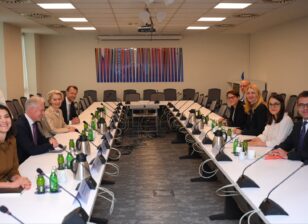
Statement of the National Convention on the European Union on the European Parliament Resolution
The National Convention on the European Union emphasizes that everything outlined in the latest European Parliament resolution on Serbia has, for months, been the subject of public warnings and statements by numerous domestic and international actors. The fact that the European Union’s highest democratic institution once again had to highlight the same unresolved and worsening issues seriously undermines the credibility of Serbia as a candidate country and sends a clear signal of stagnation in its European integration process, particularly given that the resolution was also supported by Members of the European People’s Party, whose affiliate in Serbia is the ruling Serbian Progressive Party.
The smear campaign against certain Members of the European Parliament, as well as the dismissive attitude toward the resolution expressed by the country’s top leadership, stand in stark contrast to the government’s proclaimed commitment to EU accession. Such behavior also reinforces, in the clearest possible way, the lack of democratic dialogue that the resolution itself explicitly notes.
We recall that the President of the European Commission stated last week that Serbia is under close scrutiny and that progress in European integration now requires deeds, not words. The government’s current actions, however, demonstrate the absence of genuine political will to deliver on that expectation.
Despite repeated warnings from civil society, experts, and citizens, the government continues to pursue amendments to criminal legislation without conducting a proper public debate. This is evident from the official report on the so-called “public consultation”, which omits the legally required section on the consideration and acceptance of comments from relevant stakeholders. The draft law continues to include harmful provisions that restrict freedom of assembly and expression, thereby directly shrinking the space for civil liberties.
At the same time, the process of appointing the new members of the Regulatory Authority for Electronic Media (REM) demonstrates that violations of the Law on Electronic Media persist. Attempts to secure control over the REM Council in the final stage of the process, by introducing new nominators outside the officially published list of proposals, clearly reveal a lack of genuine commitment to implementing reforms.
These developments are not isolated incidents but part of systemic patterns of political behavior that fundamentally contradict the state’s declared European orientation. Serbia cannot advance on its European path through rhetoric alone; it must do so through measurable progress in practice, in strengthening the rule of law, protecting media freedom, and upholding democratic standards.


